- Home
- Lauren Oliver
The Fearsome Firebird Page 6
The Fearsome Firebird Read online
Page 6
“It was you,” he spat out. “You killed them, didn’t you? To punish me.”
“Get your sausage out of my face,” Danny said, swatting at Farnum’s finger. “And stop talking nonsense.”
“You practically admitted it yesterday,” General Farnum thundered. “You said you wanted them dead!”
Danny puffed himself up to his full three foot seven. “You better shut your mouth, Farnum, before I shut it for you.”
“Oh, yes? You think I’m afraid of you, you murderous sad sack—?”
“That’s it, you blundering bag of—”
“Erskine’s Exterminators,” Thomas said loudly. Max saw he was reading from a business card and remembered that she, too, had received one.
General Farnum and Danny both turned to stare at him.
“What did you say?” General Farnum said.
“Ernie Erskine’s Exterminators,” Thomas repeated, and then read from the additional message printed on the back: “‘New York’s Number One Flea Exterminator. You Got ’Em, We Gas ’Em.’”
“I told you I had nothing to do with it,” Danny grumbled.
Mr. Dumfrey cleared his throat. “Would someone kindly explain to me,” he said, blinking, “what you are all babbling on about? What exterminators? Who’s Irksome?”
“Erskine,” Thomas corrected, and explained how the exterminator had visited the museum the day before, distributing business cards and trying to convince the crowd that the fleas would infest their clothing.
General Farnum squeezed his hands into fists. “That coward,” he muttered. “That criminal. I’ll make him pay for this.”
“It might have been an accident,” Thomas said. “Some of those chemicals can kill a rat from a distance of a hundred feet. If he touched the glass, even for a minute—”
“No such thing as accidents, sonny,” the general cut in, before Thomas could finish, “not when it comes to war.”
And before anyone could stop him, he pivoted on his heel and, whacking the floor so hard with his cane even the walls shuddered, stormed out the door.
There was a momentary pause.
“Cowards die a thousand deaths,” Smalls quoted somberly, removing his hat and placing it to his heart. “The valiant taste of death but once.”
“Oh, will you just shut up?” Quinn burst out. “For goodness’ sake. They’re just fleas.”
Max had turned to the windows to watch General Farnum stomping angrily down the street, his coat flapping behind him, like the leathery wings of a bat in flight. “Don’t tell Farnum that,” she said.
While the other residents of the museum dispersed, Sam volunteered to help Kestrel relocate the flea circus, since it now provided an unsavory picture to anyone who might choose to enter the lobby: all those pathetic little black dots strewn motionless across the sand, in front of miniature balance beams and sawhorses.
“One, two, three, heave,” Kestrel instructed. But no sooner had Sam laid a hand on the glass than a pane cracked under the pressure of his fingers. He drew back quickly, horrified, as a spiderweb of fissures appeared across the glass.
“Sorry,” he said, blushing so hard he could feel it all the way to the very tips of the pimples on his forehead. “I’m—clumsy—I didn’t mean to—” He still didn’t know whether Gil Kestrel, the newest addition to the museum, understood what made Sam, Pippa, Thomas, and Max so different.
Who had made them so different.
“S’all right,” Kestrel grunted, as if he hadn’t noticed. “Move aside. I’ll get it myself.”
When Kestrel braced to get a firmer grip on the large glass terrarium, a rolled-up magazine fell from his back pocket. Eager to help, Sam bent to retrieve it. Modern Aeronautics was written in large font across the cover, and, in slightly smaller type: The Joy and Beauty of Flying.
“Wow.” Sam squinted at the cover photograph, which featured a man, arms wide, standing on the wing of a small aircraft in flight. “Funny he doesn’t get blown clear off the—”
“Gimme that.” Kestrel snatched the magazine back from Sam with such force that Sam took a startled step backward. “Keep your eyes where they belong and mind your own business.”
With a final glare, Kestrel turned, heaved the glass terrarium into his arms, and teetered off into the darkness of the galleries, leaving a bewildered Sam staring after him. Sam was positive that Kestrel was upset because Sam had seen the magazine. But what was so embarrassing about an interest in airplanes? A few years ago, Thomas had gone through a flight phase. Read about a hundred and fifty books about the physics of flying and went around annoying everyone using words like propulsion and aerodynamic.
“Don’t worry about him, Sam-O.”
Sam jumped when Lash laid a weathered hand on his shoulder. When he turned, he saw that Lash’s face was grim.
Lash shook his head. “That man’s got blood in his veins sour as a lemon and cold as a Rocky Mountain snowdrift.”
“What’s the matter with him, anyway?” Sam said. “What’s he so upset about?”
Lash sighed. He shoved his cowboy hat back on his head, revealing a long red forehead, grown even longer as his fine blond hair had begun to retreat. “I’ve known Kestrel a long time,” he said, and then stopped, chewing on his lower lip.
Sam was now desperately curious. Lash was many things—but he was never, ever at a loss for words. In fact, it was nearly always impossible to get him to stop talking. Even after all the other residents of the museum had gone to bed, Lash was often still chuckling over some past performance or hilarious incident featuring people no one else knew: Sally the human seal, who preferred to eat raw fish and could balance a beach ball on her nose; Jolly Jimbo McCrae, the Minnesota fat man, who consumed 14,000 calories a day to maintain his physique and had to be moved from place to place in a specially designed wheelbarrow; Droopy Dan, the clown who never smiled, and dozens more.
“And?” Sam prompted. “You’ve known Kestrel a long time and?”
“Well, I guess there ain’t no harm in telling. Kestrel and me used to work the same circuit, along with Mr. D,” Lash began. Sam wondered again what Mr. Dumfrey’s act could possibly have been. But now wasn’t the time to press for information. “Me and ol’ Kestrel were friends, you would say. Good friends.”
Sam held his breath. There was something so strange about the way Lash was speaking, about the way he looked—lips tight, face drained of all color, eyes focused on somewhere in the far distance. Sam was gripped by a sudden sense of cold, as if a winter wind had sprung up from nowhere. “So what happened?” he asked.
Lash started slightly, as if he’d forgotten Sam was in the room. “Kestrel was a pilot,” Lash said. “Best stunt pilot there was.”
So that explained the magazine Kestrel had been reading: Kestrel must miss flying. Sam wondered how Kestrel had ended up here, sweeping up candy wrappers and popcorn kernels, plucking chewing gum from beneath the seats of the Odditorium. He stayed quiet, waiting for Lash to go on.
“We were working the traveling route then. Carny style, set up just south of Indianapolis for a week and a half. One of the tightrope walkers was a girl named Claudette.” His voice caught and he cleared his throat. “Prettiest girl south, east, or north of the Mississippi, with a heart of solid gold. She wanted to go up in Kestrel’s plane. Wouldn’t quit bugging him about it, morning, noon, and night. Finally he said okay.” A muscle worked in Lash’s jaw, like a miniature heartbeat. In and out. “I’ll never forget that day. May twenty-second, bright as bluebells, all clear sky. The kind of day that makes you think nothing bad could ever happen.”
Once again, Lash paused. Sam’s heart had begun to speed up. He could hardly control his impatience. “So what did happen?”
“He took her up, all right. Higher and higher, until the plane was just a little white bird in the sky.” Lash’s voice had grown very quiet. “Then he started pulling his usual tricks. We were all watching, you know. Free show, and wasn’t anybody in the circus who didn’t
like to watch Gil Kestrel fly. Only . . . only . . .” Once again, his voice broke.
“What?” Sam said.
Lash’s face was the color of curdled milk. “Only it turned out poor Claudette wasn’t strapped in right,” he said. “When Kestrel went into an upside-downer . . .”
Sam’s breath got tangled up somewhere behind his tonsils. He could picture it so vividly: the shrill cry of terror, the small dark figure of a girl tumbling through the sky.
Before speaking again, Lash fished a dented silver flask from his front pocket and took a long swig. He drew the back of his hand across his mouth to wipe it. “After that,” he said, “Kestrel swore off flying forever.”
Now Sam wished he hadn’t judged Kestrel so harshly. He tried to imagine what he would do if anything ever happened to Max. But even thinking about it made a space the size of a bowling ball open up inside his chest. And Max barely even spoke to him, except to snap at him for breaking things. “I don’t blame him,” he said heatedly. “It must be awful, losing your girlfriend like that.”
For the first time since starting in on his story, Lash looked at Sam. His eyes were bloodshot, as if he’d gone days without sleeping. “Claudette wasn’t Kestrel’s girlfriend,” he said quietly. “She was mine.”
“Can anyone tell me,” Thomas said, tugging at his collar, “why funeral clothes have to be so uncomfortable?”
It was the following day, and the residents of Mr. Dumfrey’s museum were gathered in the courtyard, dressed in their Sunday clothes despite it being only Tuesday, to mourn the loss of General Farnum’s extraordinary and internationally famous fleas.
Sam scanned the assembled crowd. “Max hasn’t come back yet,” he whispered.
“Shhhh.” General Farnum, looking extremely regal in a high-collared military jacket with polished brass buttons, hushed them loudly. He was standing next to Smalls—who was similarly dressed in an ill-fitting black suit—in front of a small hole that had been dug between two paving stones in the courtyard behind the museum, a few feet away from the garbage cans. Mr. Dumfrey, sweating in the afternoon sun, was busy lining the small hole with silk flower petals taken from Goldini’s trick bouquet.
“You don’t think she got into trouble, do you?” Sam lowered his voice even further.
Thomas shook his head. “Max knows how to take care of herself.”
“I said quiet,” General Farnum said gruffly. But Sam thought he detected a tremor in the general’s voice.
At that moment, the door to the kitchen swung open and Max slipped out into the courtyard. She’d left the museum soon after breakfast to try to find out whether anyone among her vast acquaintances of street urchins and message boys knew the person who had delivered Rattigan’s note to them. If they could find Rattigan’s delivery boy, they might be able to find Rattigan.
But as soon as Sam saw Max’s face, he knew she’d failed.
“No luck?” he whispered as she took a place between him and Thomas. She shook her head.
“All right.” Mr. Dumfrey straightened up, mopping his face with a handkerchief. “We’re ready to begin.” He raised his voice. “Bring out the deceased.”
Nothing happened. Miss Fitch—who hadn’t bothered to change, since she nearly always looked as if she was going to a funeral—rolled her eyes heavenward. Goldini, shifting in his patent leather shoes, leaned his head toward Mr. Dumfrey and murmured something too low for Sam to hear.
“Bring out the deceased,” Mr. Dumfrey said, a little louder.
Behind Sam, the door to the kitchen swung open a crack. Lash poked his head out. “What’s all this yim-yammin’ about a disease?”
“The bodies,” Sam whispered. General Farnum, though doing his best to conceal it, looked absolutely swollen with grief. Even his mustache was droopier than usual. “Bring out the bodies.”
“Gotcha.” Lash disappeared again.
There were the faint sounds of scuffling from behind the door, followed by a few tentative bleats of a bagpipe. Suddenly the door burst open as the music swelled and became a rhythmic, up-tempo march. Danny came first, face red, his cheeks puffed out around the bagpipe, having set aside his deep dislike of General Farnum just to have an excuse to play his beloved instrument—though Sam couldn’t help but feel that his choice of song, “When Irish Eyes Are Smiling,” might be inappropriate under the circumstances.
Caroline and Quinn came next, heads bowed, looking quite striking in their identical dark dresses, their skin nearly translucent in the sun, their long white hair threaded with flowers, elbowing each other only occasionally.
Last came Lash. He had removed his ten-gallon hat for the occasion and was wearing, in addition to the beat-up blue jeans and checkered shirt he was very rarely without, a very ill-fitting jacket he must have gotten from the costume department, with tasseled shoulder pads and elbow patches. On his upturned palm he carried a small kitchen matchbox, into which Farnum had previously siphoned all of the bodies of his beloved fleas.
The procession flowed around the miniature grave and quickly filled the courtyard. Sam was forced backward to accommodate the group and wound up placing his foot in a very squishy, pulpy, smelly pile of trash that had somehow gravitated out of the garbage can—a substance, from the looks of it, that might have been either a disintegrating sock or the remains of Goldini’s cooking from the night before. On the street level, a couple strolling hand in hand paused to gape.
Danny finished the song, extending the last note so it trembled prettily in the air. In the resulting silence, Caroline let out a dramatic sniffle and touched her face with a handkerchief. Quinn rolled her eyes.
Smalls cleared his throat. “Dearly beloved,” he began. “We are gathered here today to pay our respects to the great, the incomparable, the extraordinary fleas of General Archibald Farnum’s World-Famous Flea Circus. They were friends—”
“They were fleas,” Quinn muttered. General Farnum glared at her.
“—and, though their time was cut tragically short, our memory of them will be long. In the words of the poet, ‘Death be not proud of thyself for killing these fleas—’”
“Yes, yes,” Mr. Dumfrey said hastily, before Smalls could really get going. “Very good. Very moving. Lash, would you be so kind?”
Lash stepped forward, his face composed in an expression of great solemnity, holding the matchbox. Sam couldn’t help but look to Kestrel, who was standing as far from the group as possible, arms crossed, hat pulled low so that his face was in shadow.
What would it be like, Sam wondered, to be responsible for killing someone else, even—or especially—if you didn’t mean to? How were people like Professor Rattigan able to sleep, eat, shave, stroll with the sun on their faces, wiggle their toes in the morning, and watch baseball, knowing all of the pain and suffering they had caused? Sam’s earliest memory was of seeing his mother and father, open-eyed and staring, their arms curled around each other as if they’d died in an embrace. Rattigan believed he’d had a good reason to kill them, just as he thought he could end war by creating the most powerful army on earth. All the people he murdered and crimes he committed, he said, were for a greater good.
Despite the fact that the September air was surprisingly warm and he was wearing an old magician’s suit, complete with tails, mandated by Miss Fitch, Sam shivered.
Would it be possible that they might someday have to kill Rattigan in order to stop him? Would Sam, too, become a murderer?
That was the problem with violence. Despite what Rattigan believed, it couldn’t simply be stamped out. It was a bacteria, a disease. It spread on contact.
Lash kneeled, wincing a little, and deposited the small matchbox in its grave. Caroline let out a little sniffle. The couple had moved on down the street, and for a moment, Sam felt as if he were standing inside a lightbulb, held in a fragile glass container, in the light, with all the people he loved, in the only home he’d ever known.
“Good-bye, good soldiers,” General Farnum said, his voice t
hick with feeling. “You were brave. You were honorable. You—”
“There they are.”
A voice from the street made everyone turn. Just like that, Sam’s sense of peace and calm shattered. Max emitted a noise that could only be described as a growl.
Police officers Schroeder and Gilhooley were standing on the street above the sunken courtyard. Sergeant Schroeder, stuffed into his uniform like a turkey straining within a sock, was staring down at them with a gloating expression, as if he’d caught them in the middle of a crime. Officer Gilhooley, as always, looked as if a hard wind might suddenly blow him elsewhere—looked, in fact, as if he wished that it would.
“Ah, our old friends,” Mr. Dumfrey said, imbuing the words with a tone of great sarcasm. “To what do we owe the pleasure?”
“Save it, Dunley,” Schroeder said. He came plodding down the steps, huffing, holding up his badge as if it were a talisman that might keep him protected from great evil. “Move aside, please, move aside. Is there an Archibald Farnum here?”
“I’m General Farnum,” General Farnum said, drawing himself up. “What’s this about?”
Schroeder drew his lips back over his teeth. It was a horrible smile—like the smile of a shark just before it eats you. “Turn around, please, and hands behind your back.”
There was an immediate outcry. Everyone began to shout.
“What’s the meaning of this?” General Farnum spluttered, even as Schroeder knocked the cane from Farnum’s hands and spun him around. In one fluid motion, he unclipped a pair of handcuffs from his belt. “You can’t be serious.”
“Lay off of him!” Max shouted.
“He didn’t do anything,” Pippa cried.
Schroeder ignored them. He was obviously enjoying himself. “Archibald Farnum,” Schroeder announced, speaking loudly so that he could be heard over the din. “You’re under arrest”—here there was a collective intake of breath, and just for a second, it got very still, and very silent—“for the murder of Ernie Erskine.”

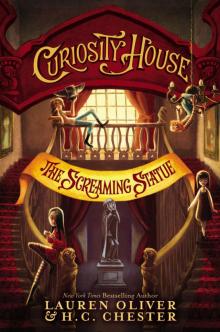 The Screaming Statue
The Screaming Statue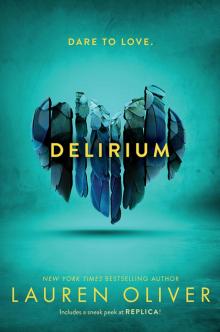 Delirium
Delirium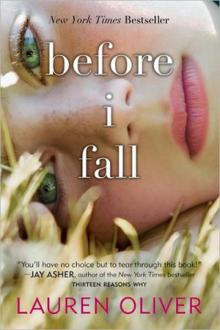 Before I Fall
Before I Fall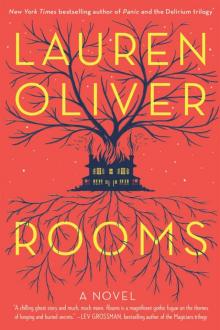 Rooms
Rooms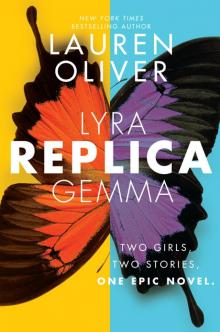 Replica
Replica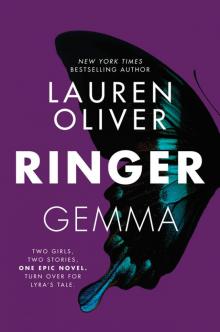 Ringer
Ringer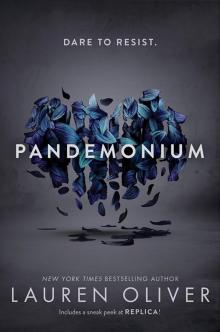 Pandemonium
Pandemonium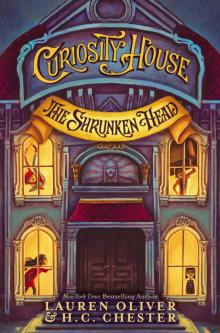 The Shrunken Head
The Shrunken Head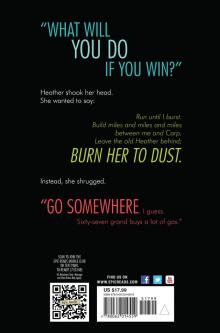 Panic
Panic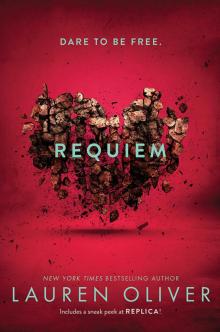 Requiem
Requiem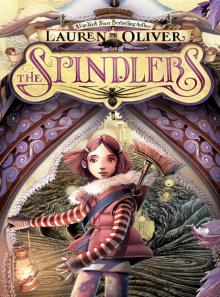 The Spindlers
The Spindlers Annabel
Annabel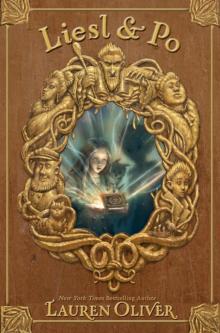 Liesl & Po
Liesl & Po Raven
Raven Alex
Alex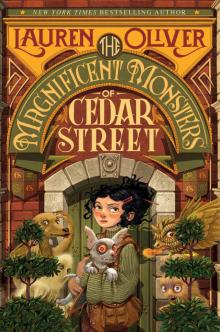 The Magnificent Monsters of Cedar Street
The Magnificent Monsters of Cedar Street Vanishing Girls
Vanishing Girls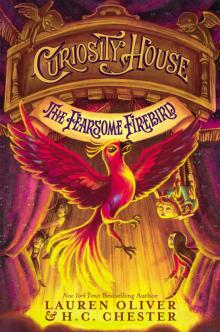 The Fearsome Firebird
The Fearsome Firebird Raven: A Delirium Short Story
Raven: A Delirium Short Story Annabel: A Delirium Short Story
Annabel: A Delirium Short Story Hana: A Delirium Short Story
Hana: A Delirium Short Story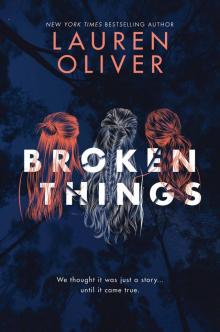 Broken Things
Broken Things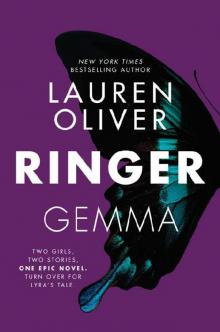 Ringer (Replica)
Ringer (Replica) Alex (delirium)
Alex (delirium)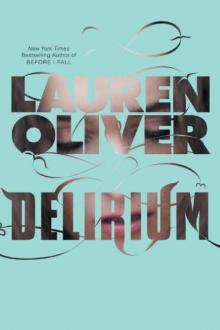 Delirium dt-1
Delirium dt-1